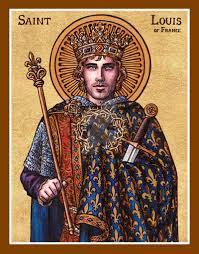HOMILY WEEK 21 04 – Year II
Called to be Saints:
Optional Memorial of St. Louis
(1 Cor 1:1-9; Ps 145; Mt 24:42-51)
******************************************
Ovide Charlebois, first bishop of the Archdiocese of Keewatin-The Pas, claimed that one’s life would be wasted if it was not spent trying to be a saint.
St. Paul, in today’s first reading, is clear – we are all called to be saints.
In his letter to his beloved Corinthians, St. Paul outlines some of what is involved in responding to that call. We are first of all to call on the name of our Lord Jesus Christ. That alludes to prayer. Certainly, the life of a saint is one of deep prayer, of communing with God, meditating on God’s Word, lifting up to God what is in our hearts and on our minds, conversing with God, and resting in God’s presence through contemplative prayer.
Then St. Paul reminds us that the grace of God is always at work in us. That alludes to the Holy Spirit given to us by Jesus, who then fills us with the gifts of the Holy Spirit. Traditionally, these are Wisdom, Understanding, Right judgment or Counsel, Courage or Strength, Knowledge, Reverence or Fear of the Lord, Wonder and Awe or Delight. These gifts, according to St. Paul, bear fruit within us, such as love, joy, peace, forbearance, kindness, goodness, faithfulness, gentleness and self-control, all making a difference in our lives.
As saints, we are then challenged by St. Paul to be “blameless on the day of our Lord Jesus Christ.” This connects us with the teaching of Jesus in the gospel to keep awake and be ready, for he will come at an unexpected hour. This means we need to be attentive to our inner state, our emotions and our need for both forgiveness and healing, even on a daily basis.
As the Messiah, Jesus came to redeem and to sanctify, to forgive and to heal, so we can always come to him for both forgiveness and healing. If we feel any guilt about any of our actions, the best thing we can do is celebrate the sacrament of reconciliation, which I try to do on a monthly basis, usually during or close to my poustinia retreat. Every evening, however, we could do an examen of our consciousness, and be open to receive forgiveness from Jesus.
The fact that, for St. Paul, we are called into fellowship with Jesus Christ our Lord, can also be a measure of our blamelessness. We have all experienced, I am sure, times when we have hurt a friend, even unintentionally, and how that hurt has affected our relationship with that friend. Once, I wasn’t paying attention when a friend was sharing something important with me, which he noticed, and that affected our relationship afterwards. Well, if we are in fellowship with Jesus, we need to be attentive to anything we may have done or said to someone else that might have affected our relationship with Jesus, inviting us to do metanoia, to repent and come to Jesus for forgiveness of our sin, and healing of our sinfulness, that which made us hurt that person in the first place.
In the end, if we are genuinely and sincerely living in the kingdom of God, trying to keep the commandments to love God, others, ourselves and even our enemies, and trying to live the Beatitudes Jesus gave us, we can and should see ourselves as St. Paul sees us, as saints making their way back home to the Father as best we can.
 Today, the Church offers us St. Louis as a model of sainthood. Born in 1214, Louis IX became king of France at the age of 12. His mother acted as regent until his majority. A man of justice, mercy, peace and piety, Louis negotiated several treaties with his European neighbors, made the French nobility live up to its obligations and encouraged the use of Roman law. Thomas Aquinas and Robert de Sorbon were among his friends; the king supported Robert’s foundation of a theological institute, which became the famous Sorbonne university. Gothic architecture flourished during his reign, particularly in the building of chapels and great cathedrals such as Sainte-Chapelle in Paris. Louis organized a crusade in 1270 and left for Tunisia, where he contracted typhoid fever and died on this day. Louis is a patron of masons and sculptors.
Today, the Church offers us St. Louis as a model of sainthood. Born in 1214, Louis IX became king of France at the age of 12. His mother acted as regent until his majority. A man of justice, mercy, peace and piety, Louis negotiated several treaties with his European neighbors, made the French nobility live up to its obligations and encouraged the use of Roman law. Thomas Aquinas and Robert de Sorbon were among his friends; the king supported Robert’s foundation of a theological institute, which became the famous Sorbonne university. Gothic architecture flourished during his reign, particularly in the building of chapels and great cathedrals such as Sainte-Chapelle in Paris. Louis organized a crusade in 1270 and left for Tunisia, where he contracted typhoid fever and died on this day. Louis is a patron of masons and sculptors.
The Eucharist is an experience of forgiveness and healing, empowering us to go and be saints, wounded healers for others. So remember, we are called to be saints, to receive God’s unconditional love as forgiveness and healing, and walk with Jesus as a friend, as did St. Louis.



